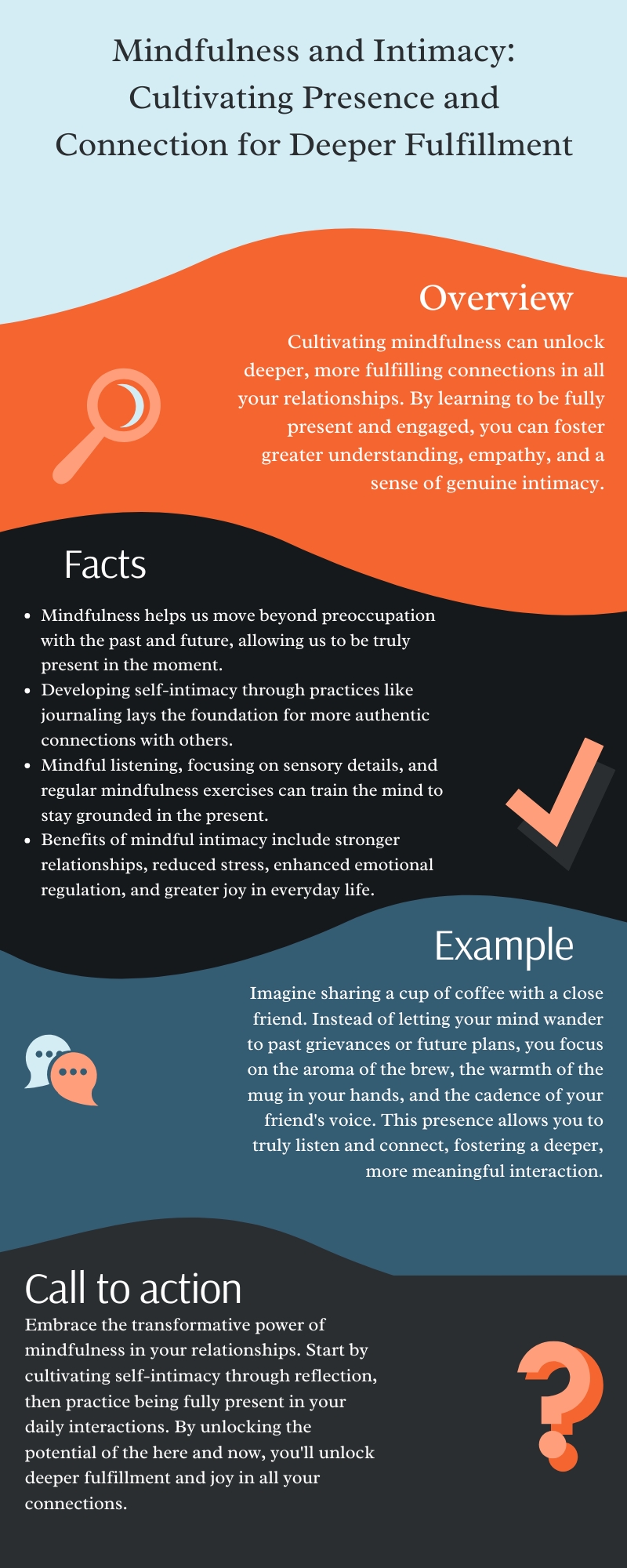Intimacy, the feeling of deep closeness and connection extends far beyond romantic relationships. It encompasses the bonds we forge with friends, family members, and even acquaintances. Intimacy is the bedrock of emotional, mental, and spiritual connections, nourishing our sense of belonging and fulfillment.
However, despite our innate human need for social connection, cultivating and sustaining meaningful connections can feel increasingly difficult in today’s fast-paced world.
Mindfulness, the practice of bringing our attention to the present moment without judgment, offers a pathway to fostering more profound and authentic connections. By cultivating presence in our interactions, we can unlock the potential for deeper intimacy and lasting fulfillment in all our relationships.
Key Takeaways:
- Mindfulness unlocks the path to deeper, more authentic intimacy in all our relationships.
- Cultivating self-intimacy through practices like journaling lays the foundation for meaningful connections with others.
- Actively listening, focusing on sensory details, and incorporating mindfulness exercises into daily life are keys to engaging with others mindfully.
- Mindful intimacy offers benefits like stronger connections, reduced stress, enhanced emotional regulation, and greater joy in everyday experiences.
- Embracing the present moment and viewing each interaction as a precious gift is the doorway to lasting fulfillment in our relationships.

The Past and Future’s Impact on Present Intimacy
Often, our minds are preoccupied with thoughts of the past and future, diverting our attention from the richness of the present moment. While learning from past experiences is crucial, allowing past emotions to color our present perceptions can create biases that hinder genuine connection.
For instance, imagine touching a hot pot without protection and burning your hand. The next time you encounter a pot, you might instinctively recoil, even if it’s not hot. This reaction stems from the fear and pain associated with the experience, rather than the reality of the present situation.
Similarly, fixating on future expectations or anxieties can prevent us from fully engaging with the person in front of us. Instead of listening attentively to someone sharing their thoughts, we might be mentally composing our response or worrying about upcoming events. This mental distraction prevents us from truly connecting with the other person and experiencing the fullness of the present moment.

Cultivating Mindfulness for Deeper Intimacy
1. Self-Intimacy: The Foundation of Connection
Before we can authentically connect with others, we must first cultivate a deep sense of intimacy with ourselves. Taking the time to understand our thoughts, feelings, needs, and desires is crucial for building genuine connections. Practices such as journaling or introspection can help us explore our inner landscape and gain clarity about who we are and what we seek in relationships.
By nurturing a strong foundation of self-intimacy, we become better equipped to approach relationships with authenticity and vulnerability, fostering deeper connection and understanding.
2. Engaging with Others Mindfully: The Art of Presence
Cultivating mindful intimacy in our interactions requires conscious effort and practice. Approaching conversations with mindfulness, compassion, and empathy allows us to truly connect with the person in front of us. Active listening is a cornerstone of mindful communication. When we listen intently, without judgment or interruption, we demonstrate genuine interest and respect for the other person’s perspective. This type of listening deepens understanding and creates a space for genuine connection to flourish.

In addition to active listening, focusing on sensory details during interactions can help anchor us in the present moment. Instead of allowing our minds to wander, we can consciously direct our attention to the sights, sounds, and sensations of the present experience. For example, while drinking coffee with a friend, we can savor the aroma, taste the richness of each sip, and observe the subtle details of the coffee cup. By immersing ourselves in the sensory experience, we become more present and engaged in the interaction.
3. Training the Mind for Presence: Practice and Repetition
Just like training a muscle, cultivating mindfulness requires consistent practice and repetition. By incorporating short mindfulness exercises into our daily routines, we can gradually strengthen our capacity for present-moment awareness. Simple practices like focusing on a painting, observing the flight of a bird, or consciously savoring the taste of food can help train our minds to stay present.
As we practice these exercises regularly, our ability to focus on the here and now becomes more effortless and integrated into our daily lives. With patience and perseverance, we can cultivate a state of presence that naturally extends to our interactions with others.

Benefits of Mindful Intimacy
The practice of mindful intimacy offers a wealth of benefits for our relationships and overall well-being. By being fully present in our interactions, we communicate genuine care and create space for deeper understanding. Mindful intimacy fosters stronger connections, reduces stress, and enhances emotional regulation.
When we engage in mindful conversations, we listen more attentively, respond with greater empathy, and foster a sense of mutual respect. These practices enhance communication and strengthen the bonds of intimacy. Furthermore, by cultivating presence, we experience a greater sense of joy and appreciation in our daily lives. The simple act of drinking coffee can become a moment of profound contentment when we savor each sip with mindful awareness. Similarly, walks in nature become more vibrant and engaging when we tune into the sights, sounds, and sensations of the present moment.
Here are some of the key benefits of mindful intimacy:
| Benefit | Description |
|---|---|
| Stronger Connections | Mindful presence fosters deeper understanding and empathy in our relationships. |
| Reduced Stress | Focusing on the present moment helps to alleviate anxiety and stress. |
| Enhanced Emotional Regulation | Mindfulness practice improves our ability to manage and process emotions. |
| Greater Joy and Appreciation | Cultivating presence allows us to fully savor the richness of everyday experiences. |
| Improved Communication | Mindful listening and response enhance the quality of our interactions. |
Conclusion
Mindful intimacy has the power to transform our relationships and enrich our lives. By cultivating presence and connection in our interactions, we unlock a deeper level of fulfillment and joy. This journey requires patience, intentionality, and a willingness to embrace the present moment.
As we practice mindful intimacy, we cultivate a sense of belonging, deepen our connections, and experience the fullness of life in all its richness. Embracing the power of the present moment, savoring each interaction as a precious gift, opens the door to deeper intimacy and lasting fulfillment in all our relationships.
FAQs
1. How can mindfulness help improve intimacy in my relationships?
Mindfulness helps improve intimacy by enabling us to be fully present and engaged with the people in our lives. By cultivating self-awareness, active listening, and a focus on the sensory details of our interactions, we can foster deeper understanding, empathy, and connection in all our relationships.
2. What are some practical ways to incorporate mindfulness into my daily life?
Incorporating mindfulness practices into your daily routine can be as simple as taking a few minutes to focus on your breathing, observing the flight of a bird, or consciously savoring the taste of your morning coffee. The key is to start small and make mindfulness a consistent habit. Over time, these practices will help train your mind to stay grounded in the present moment, which will naturally carry over into your interactions with others.
3. How does self-intimacy lay the foundation for more meaningful connections?
Before we can truly connect with others, we need to develop a strong understanding and acceptance of ourselves. Practices like journaling and introspection help us explore our thoughts, feelings, needs, and desires. This self-intimacy allows us to approach relationships with authenticity and vulnerability, creating the conditions for deeper, more fulfilling connections.
4. What are some of the tangible benefits of cultivating mindful intimacy?
Mindful intimacy offers a wealth of benefits, including stronger relationships, reduced stress, enhanced emotional regulation, and a greater sense of joy and appreciation in everyday life. When we engage with others mindfully, we listen more attentively, respond with empathy, and foster a sense of mutual respect – all of which strengthen the bonds of intimacy.


